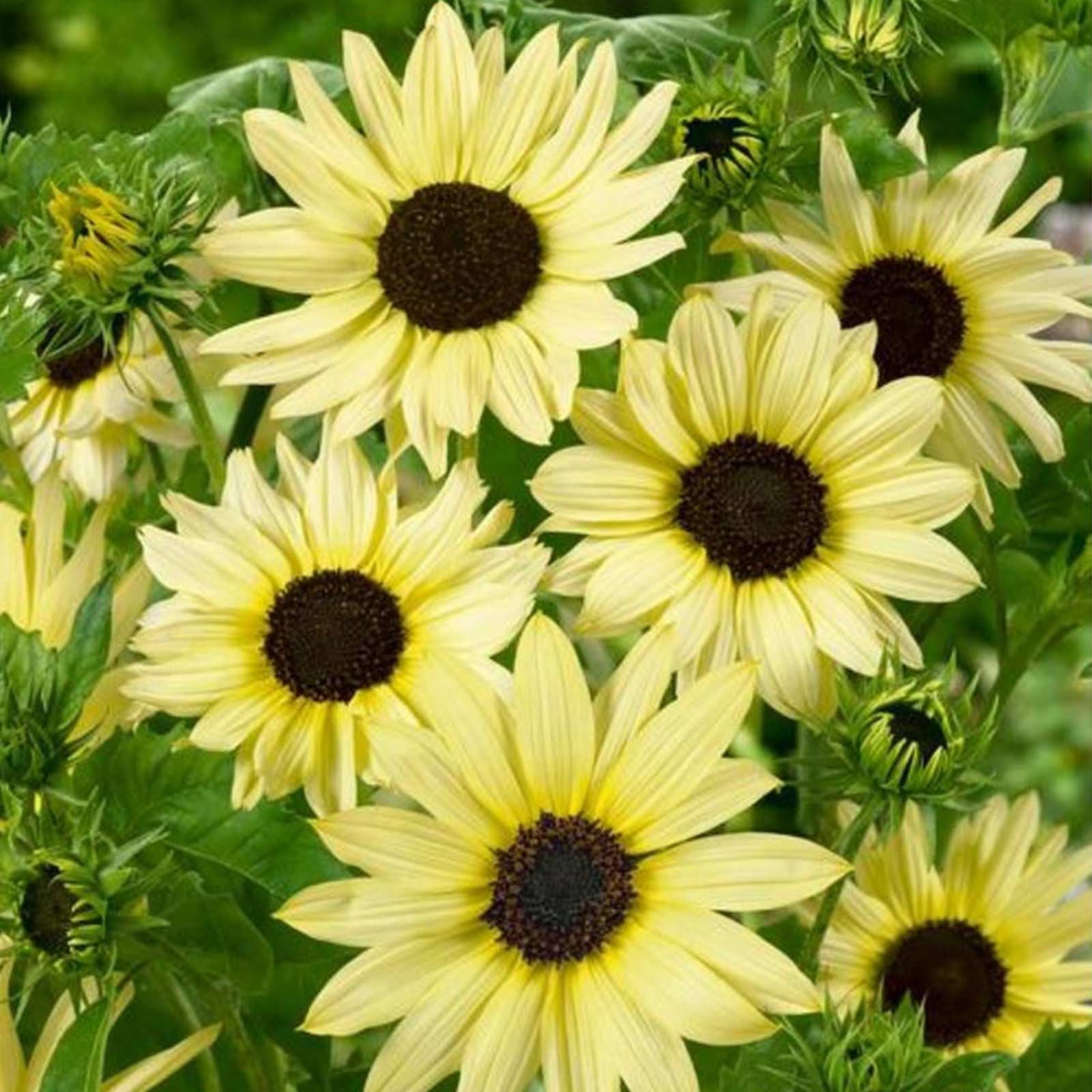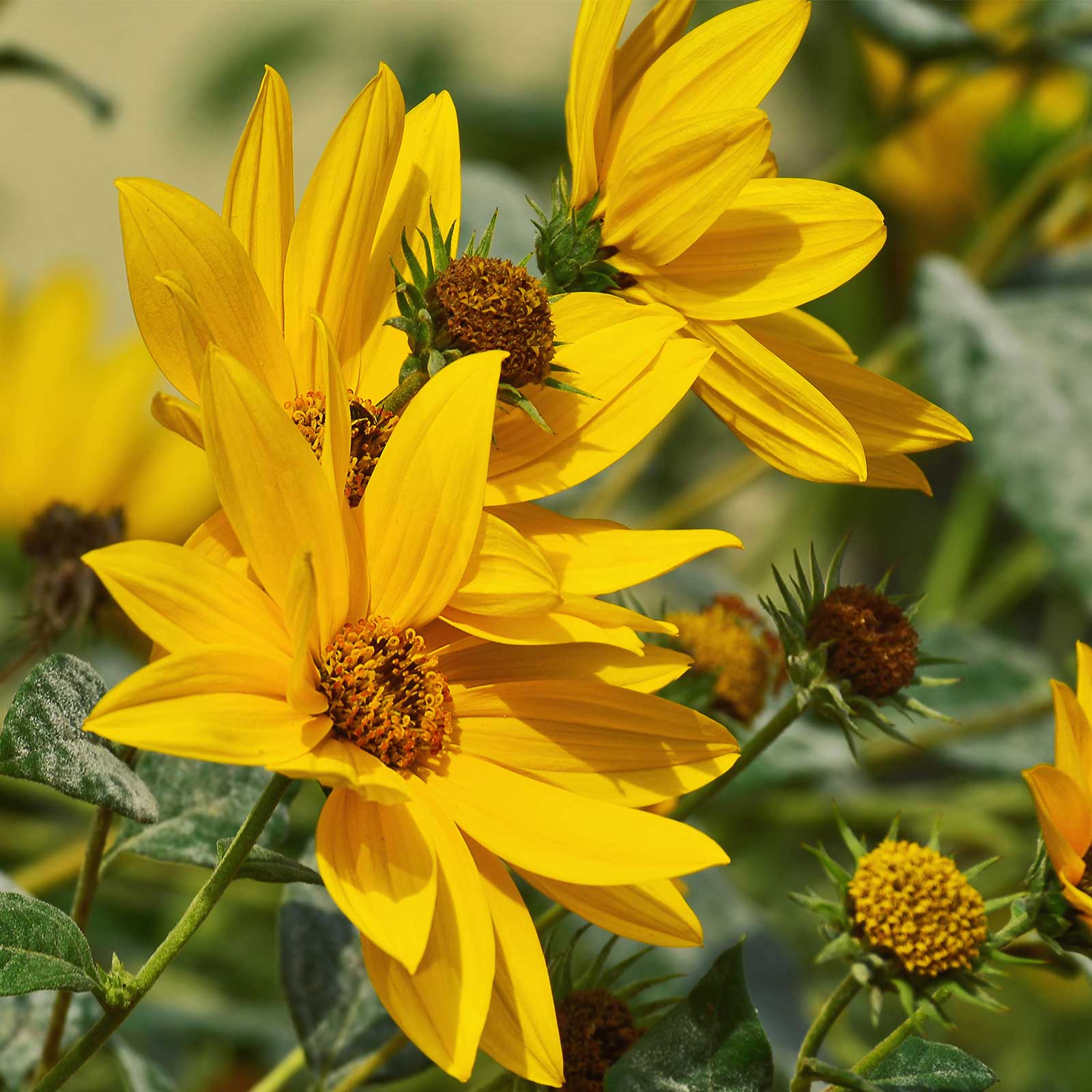About Sunflower Plants
Sunflower plants (scientific name: Helianthus annuus) are a popular choice for planting in gardens, fields, and farms. These annual plants are known for their tall, sturdy stems and large, colorful flowers that attract bees, birds, and other pollinators.
Sunflower seeds can also be planted to grow new sunflower plants. They are easy to cultivate and can thrive in a variety of soil types and climates.
Where to Buy Sunflower Seeds (Top 3 Picks)

A vibrant mix of lovely “sunset” colors, oranges, reds, yellows and various patterns th… [More]

Helianthus annuus 4 feet. It’s multi-branching growth form and creamy flowers surround… [More]

Helianthus maximiliani 4-8 feet. Perennial sunflower produces tons of bright yellow, s… [More]
Sunflower Seeds Germination Instructions
- Choose a sunny location: Sunflower plants require at least 6-8 hours of sunlight daily to grow well.
- Prepare the soil: Sunflowers prefer loose, well-draining soil to germinate. Loosen the soil to a 6-8 inches depth and remove any rocks or debris.
- Plant the seeds: Sow the sunflower seeds directly into the soil about 1 inch deep and 6 inches apart. Cover the seeds with soil and gently press down to ensure good seed-to-soil contact.
- Water the soil: Water the soil immediately after planting to help the seeds settle in. Keep the soil moist but not waterlogged, watering as needed to keep the top inch moist.
- Watch for germination: Sunflower seeds typically germinate within 7-10 days but may take up to 2 weeks.
- Thin the seedlings: Once the sunflower seedlings have grown to about 2 inches tall, thin them out to one plant every 12-18 inches. This will give each plant enough space to grow and develop properly.
Best Soil & Container For Sunflowers

Sunflowers prefer well-draining soil that is rich in nutrients. Use fertile and loamy soil that is slightly acidic with a pH level between 6.0 and 7.5.
When growing sunflowers in a container, use a potting mix specially formulated for sunflowers or a general-purpose potting mix mixed with sand or perlite to improve drainage.
If you are planting sunflowers in your garden, you can improve your soil’s fertility by adding compost or well-rotted manure to the planting area before planting.

For sunflowers, a pot with a diameter of at least 18-24 inches and a depth of at least 12 inches is recommended. Make sure the pot has enough drainage holes to allow excess water to escape and prevent waterlogging.
Sunflowers can grow quite large and heavy, so choose a pot that is sturdy enough to support the plant. Plastic and ceramic pots are good options. Avoid lightweight materials such as thin plastic or terracotta which can tip over in windy conditions.
Temperature & Light Requirements For [Plant Name]

Sunflowers need at least 6-8 hours of direct sunlight per day. Sunflowers that receive less than 6 hours of direct sunlight per day may not grow to their full potential resulting in smaller flowers.

Germination temperature: Sunflower seeds require soil temperatures of at least 50-55°F (10-13°C) to germinate. Soil that is too cold can slow down or prevent germination.
Optimal growing temperature: Sunflowers grow best in temperatures between 68-86°F (20-30°C). They can tolerate higher temperatures, but prolonged exposure to temperatures above 95°F (35°C) can stress the plant and reduce its growth.
Common Pests & Diseases for Sunflower Plant
- Aphids: These small, soft-bodied insects can cause damage to the leaves and flowers of sunflower plants by sucking sap from the plant. They can also transmit viruses to the plant.
- Sunflower moth: This pest can damage the developing flower buds and cause the flowers to drop prematurely.
- Sclerotinia stem rot: This fungal disease can cause wilting and rotting of the stem, leaves, and flower heads of sunflowers.
- Downy mildew: This fungal disease causes yellowing and wilting of the leaves, and can eventually lead to the death of the plant.
- Rust: This fungal disease causes yellowish-orange spots on the leaves, stems, and flowers of sunflowers.
- Verticillium wilt: This fungal disease causes wilting and yellowing of the leaves, and can lead to the death of the plant.
FAQs
How many sunflower seeds per plant?
Generally speaking, a mature sunflower head can contain hundreds or even thousands of seeds.
When to plant sunflower seeds indoors?
Sunflowers are typically started indoors 4 to 6 weeks before the last expected frost date in your region.
How far apart to plant sunflower seeds?
Plant the sunflower seeds about 6 inches apart and 1 inch deep. This will give them enough space to grow and mature without being overcrowded.
Which way to plant sunflower seeds?
Plant the pointy end facing down and the flat end facing up. This is because the pointy end is where the root will emerge, and planting it downwards will help the root grow straight down into the soil.
How long do sunflower seeds last for planting?
Sunflower seeds that have been stored properly can remain viable for planting for up to 5 years.
Are sunflower plants perennials?
Sunflowers are typically grown as annuals, meaning they complete their life cycle in one growing season. However, some species of sunflowers can be grown as perennials in certain climates and conditions.
Are sunflower plants toxic to dogs?
Sunflower plants are not considered toxic to dogs. However, the seeds of the sunflower plant can be harmful to dogs if consumed in large quantities.
How long for sunflower seeds to grow?
Sunflower seeds typically take around 7 to 14 days to germinate and emerge from the soil. It takes around 70 to 100 days from planting to harvest for most sunflower varieties. Some dwarf varieties can mature in as little as 45 days, while larger varieties may take up to 120 days.
Why is my sunflower plant dying?
Common causes of sunflower plant death include:
- Lack of Water
- Overwatering
- Poor Soil Quality
- Pests and Diseases
- Extreme Temperatures
Which sunflower produces the most seeds?
The Russian Giant sunflower (Helianthus annuus ‘Russian Giant’) can grow up to 14 feet tall and produces large heads that can reach up to 20 inches in diameter. Each head can contain up to 2,000 edible seeds.
How many sunflower plants per acre?
The recommended plant density for sunflowers is between 15,000 and 30,000 plants per acre.
How long do sunflower plants live?
Most sunflower plants typically live for about three to five months.





